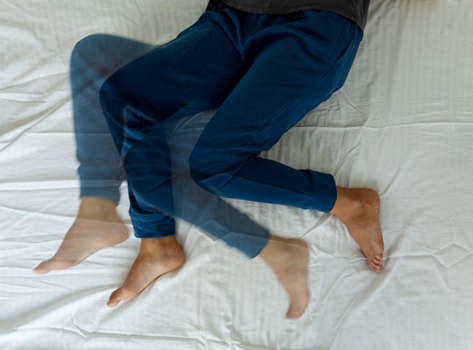For adults who have restless leg syndrome, peaceful sleep is often disturbed by restlessness and the urge to move their legs—and sometimes their arms. It typically creeps up at night with uncontrollable twitching and an irresistible need to relieve throbbing, aching leg sensations.
According to Kalpeshkumar Patel, MD, a sleep medicine specialist at Atlantic Health System, RLS affects more women than men, and also children. It can begin at any age, and it tends to worsen over time, disturbing sleep and interfering with daily activities and lifestyle.
What is restless leg syndrome?
Restless leg syndrome is a neurological condition that causes a strong urge to move the legs. It typically happens in the evening and at night when sitting or lying down. Moving eases the discomfort for a short time but the sensation usually returns.
“Whether symptoms are constant or intermittent, when involuntary leg movements interfere with sleep, it affects daytime functioning and may cause fatigue, daytime sleepiness, lack of concentration, and changes in mood or behavior,” says Atlantic Health System sleep medicine specialist Matthew Epstein, MD.
How to relieve restless leg syndrome symptoms
- Massage the legs
- Take a warm evening bath
- Apply cold compresses
- Avoid caffeine and alcohol four hours before bedtime
- Increase physical activity
- Establish a regular sleep schedule
- Try mind-calming relaxation techniques
Dr. Epstein explains that restless leg syndrome can often be underdiagnosed or misdiagnosed as nocturnal or nighttime leg cramps. As a result, many people live with symptoms for years, even decades, because they’re not sure or aware of where to turn.
“If you’re experiencing persistent RLS symptoms, schedule an evaluation with a sleep specialist,” says Dr. Epstein. “We explore your medical and family history, discuss your symptoms, and also evaluate you for potential underlying causes of RLS, including iron deficiency, anemia or underlying health conditions that may contribute.”
What might be causing your symptoms?
- Iron or vitamin deficiency
- Sleep deprivation
- Genetics and family history of RLS
- An underlying health issue: diabetes, kidney failure, nerve damage
- Pregnancy
- Use of certain over-the-counter medications
- Mood medications (selective serotonin reuptake inhibitors or SSRIs)
To properly diagnose a patient, Dr. Patel explains that he performs a thorough medical history, physical exam, and investigation of bloodwork. He says, “About half the patients we see with restless leg syndrome have an iron deficiency. A simple iron supplement can sometimes dramatically resolve restless leg symptoms.”
How can a sleep specialist help?
If conservative measures don’t seem to help, your sleep doctor may prescribe medication to relieve symptoms.
“When we help patients address the underlying causes, make lifestyle changes, incorporate medications, or use other pain management strategies, a patient’s symptoms usually improve or completely resolve,” says Dr. Patel. “There’s no need to live with discomfort that interferes with your sleep patterns and daily functioning.”





